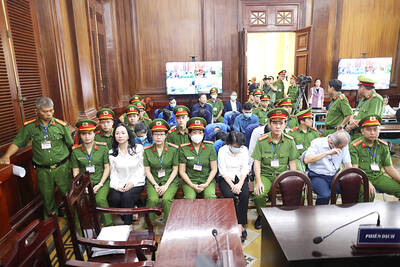The Sri Lankan government is digging a moat around one of its landfills to keep out hungry elephant herds, and reduce conflicts between the animals and villagers.
Dozens of elephants lumber out of the forest daily into a garbage dump near the eastern town of Ampara, rummaging through mounds of trash for wilted vegetable scraps.
This has become a common sight at the country’s three largest landfills, which are next to wildlife protection zones.
The elephants consume plastic along with the food scraps, which slowly kills them, officials say.
Last year, a record 361 elephants died mainly because of humans, local environmental groups reported.
The Ampara landfill was created about a decade ago in the middle of an elephant corridor that is home to 200 to 300 elephants. Electric fences have not worked to keep the determined animals away.
“There is no proper plan or a system for this,” said P.H. Kumara, part of the Gal Oya Farmers Committee, a farming collective in the region around Ampara.
“Government institutions have established landfills on the border of wildlife protection zones. Once that is done, the wild elephants and other wild animals who eat the rubbish die,” Kumara said.
The government is now trying to dig trenches around the facility to deter the animals. Villagers, who have had an uneasy coexistence with the wild herds, say that the situation is only getting worse.
“The wild elephants that come to the landfill hang around here day and night,” Kumara said. “Then they go into neighboring villages and harm the villagers, their property and agricultural land. The end result is that the human-elephant conflict gets worse and we lose elephants that are a national asset.”
There are about 7,500 wild elephants in Sri Lanka, which has a population of 22 million people.
Domesticated elephants are revered in the nation, and are used in religious and cultural events throughout the year.

Republican US lawmakers on Friday criticized US President Joe Biden’s administration after sanctioned Chinese telecoms equipment giant Huawei unveiled a laptop this week powered by an Intel artificial intelligence (AI) chip. The US placed Huawei on a trade restriction list in 2019 for contravening Iran sanctions, part of a broader effort to hobble Beijing’s technological advances. Placement on the list means the company’s suppliers have to seek a special, difficult-to-obtain license before shipping to it. One such license, issued by then-US president Donald Trump’s administration, has allowed Intel to ship central processors to Huawei for use in laptops since 2020. China hardliners

A top Vietnamese property tycoon was on Thursday sentenced to death in one of the biggest corruption cases in history, with an estimated US$27 billion in damages. A panel of three hand-picked jurors and two judges rejected all defense arguments by Truong My Lan, chair of major developer Van Thinh Phat, who was found guilty of swindling cash from Saigon Commercial Bank (SCB) over a decade. “The defendant’s actions ... eroded people’s trust in the leadership of the [Communist] Party and state,” read the verdict at the trial in Ho Chi Minh City. After the five-week trial, 85 others were also sentenced on

Conjoined twins Lori and George Schappell, who pursued separate careers, interests and relationships during lives that defied medical expectations, died this month in Pennsylvania, funeral home officials said. They were 62. The twins, listed by Guinness World Records as the oldest living conjoined twins, died on April 7 at the Hospital of the University of Pennsylvania, obituaries posted by Leibensperger Funeral Homes of Hamburg said. The cause of death was not detailed. “When we were born, the doctors didn’t think we’d make 30, but we proved them wrong,” Lori said in an interview when they turned 50, the Philadelphia Inquirer reported. The

RAMPAGE: A Palestinian man was left dead after dozens of Israeli settlers searching for a missing 14-year-old boy stormed a village in the Israeli-occupied West Bank US President Joe Biden on Friday said he expected Iran to attack Israel “sooner, rather than later” and warned Tehran not to proceed. Asked by reporters about his message to Iran, Biden simply said: “Don’t,” underscoring Washington’s commitment to defend Israel. “We are devoted to the defense of Israel. We will support Israel. We will help defend Israel and Iran will not succeed,” he said. Biden said he would not divulge secure information, but said his expectation was that an attack could come “sooner, rather than later.” Israel braced on Friday for an attack by Iran or its proxies as warnings grew of